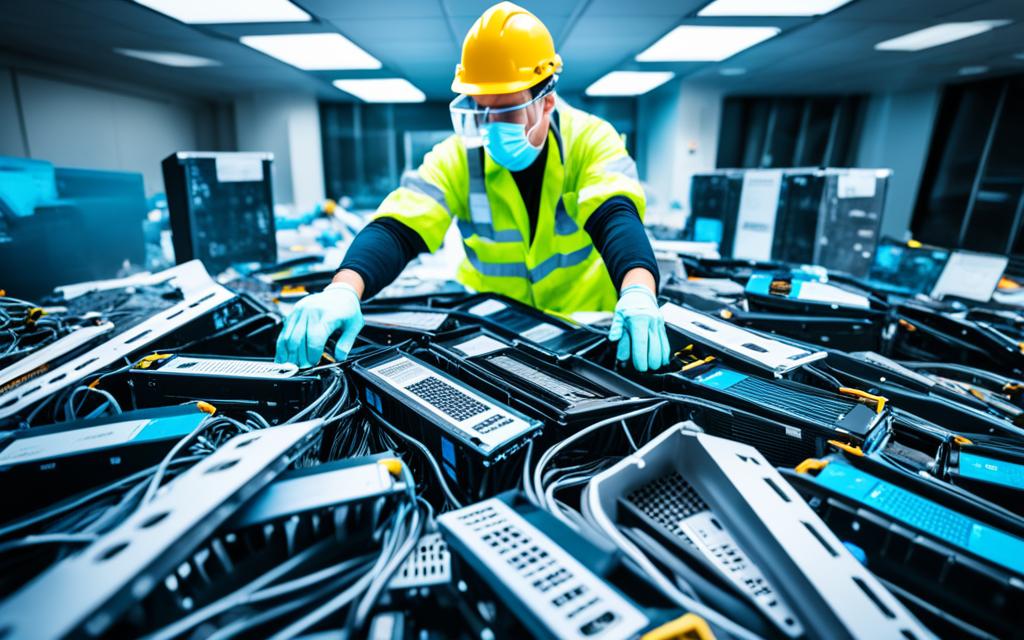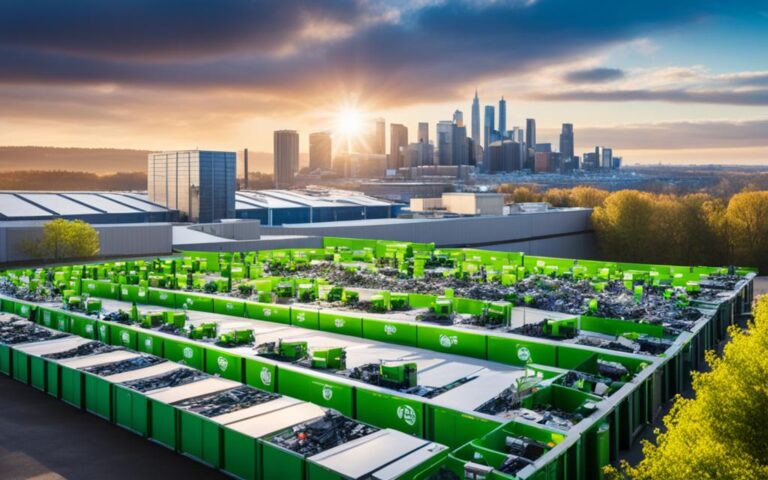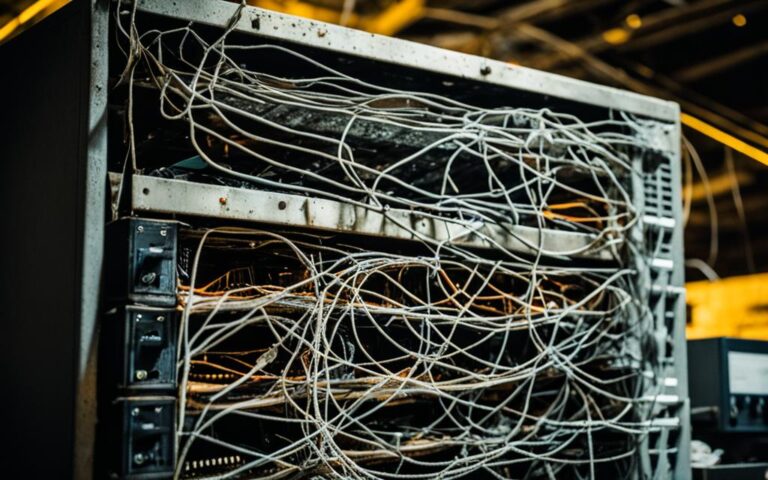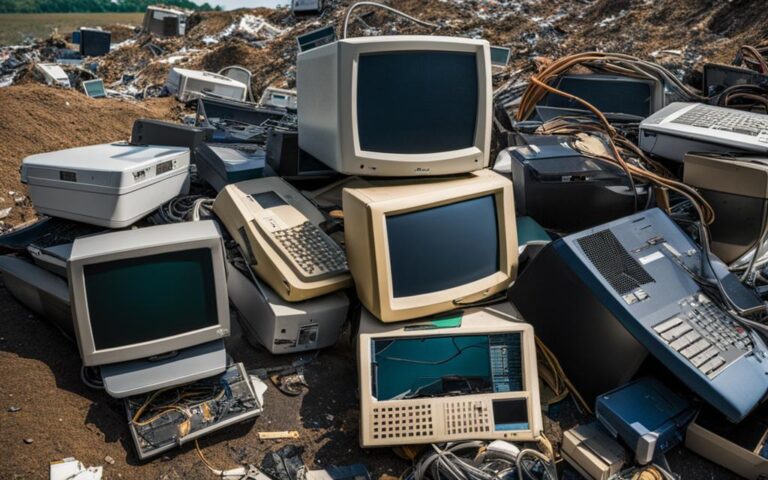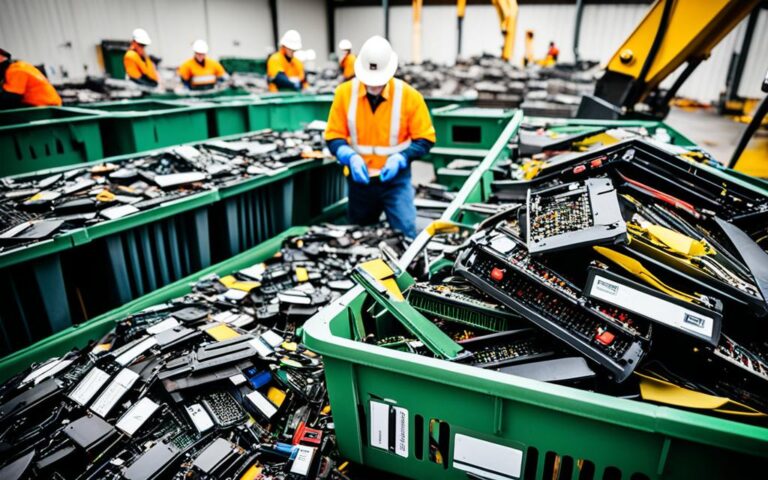Server Recycling: Understanding the Global Impact
Server recycling is not just about getting rid of old servers; it has a profound impact on sustainability efforts worldwide. By embracing server recycling, we can make a significant contribution to creating a greener future. Join the greener future initiative by understanding the importance of server recycling and its global impact.
Server recycling protects sensitive data, reduces e-waste, conserves resources, and minimizes our environmental footprint. By properly disposing of servers, we safeguard sensitive information and mitigate the risk of data breaches. This not only protects a company’s reputation but also ensures compliance with data protection regulations.
Additionally, server recycling helps mitigate environmental risks by preventing toxic components from ending up in landfills. By adopting sustainable practices and responsibly recycling servers, we can reduce the demand for raw resources and minimize the environmental impact of electronic waste.
The process of server recycling involves breaking down servers into their component parts. These components, including valuable metals, plastics, and hazardous materials, can be reused or recycled in an environmentally responsible manner. By directing each component towards the most appropriate and sustainable end-use, we maximize resource efficiency and minimize waste.
Proper server disposal requires careful planning and execution. It starts with creating a comprehensive backup of all data on the server, followed by secure data wiping. Different disposal methods, such as repurposing, recycling, or secure destruction, can be chosen based on the condition of the server. Working with certified recycling facilities that follow best practices ensures environmental safety and data protection.
By embracing proper server recycling practices, businesses can enjoy multiple benefits. Server lifecycle is prolonged, maximizing resource efficiency and potentially leading to cost savings. Recycling servers also aids in reducing e-waste and lowers waste disposal costs. Furthermore, through thorough data wiping, sensitive data is safeguarded, compliance is achieved, and a company’s reputation is enhanced.
Understanding the global impact of server recycling is crucial in our journey towards a sustainable future. By implementing proper server disposal practices and following the step-by-step guide to effective server recycling, organizations can contribute to resource conservation, reduce electronic waste, and protect sensitive data. Join the greener future initiative by prioritizing server recycling. Together, let’s make a difference.
The Importance of Proper Server Disposal
Proper server disposal is crucial for several reasons. Firstly, it ensures data protection and minimises the risk of data breaches, which can harm a company’s reputation and result in fines. Secondly, it helps to mitigate environmental risks by preventing toxic components within servers from ending up in landfills. By disposing of servers responsibly, we can protect both our data and the environment.
When it comes to server disposal, it’s essential to consider the potential consequences of improper handling. Discarded servers may contain sensitive information that, if not properly destroyed, can be exposed and exploited. This can not only damage a company’s reputation but also lead to legal and financial repercussions. By implementing proper server disposal practices, businesses can safeguard their data and protect themselves from costly breaches.
The Risks of Improper Disposal
Improperly disposed servers can pose significant environmental risks. These devices often contain toxic components, such as heavy metals and chemicals, which can infiltrate the soil, water, and air when dumped in landfills. These hazardous substances have the potential to contaminate ecosystems and harm human health. By disposing of servers responsibly, we can prevent these environmental risks and contribute to a greener future.
“Proper disposal of servers is not just a matter of compliance; it’s a responsibility we must uphold to protect our data and the planet.”
Fortunately, there are eco-friendly solutions available for proper server disposal. Recycling companies specializing in electronic waste management can safely dismantle servers, extract valuable components for reuse or recycling, and dispose of toxic materials in an environmentally responsible manner. By partnering with such companies, businesses can ensure that their old servers are handled in a way that minimises environmental impact while adhering to data security protocols.
Best Practices for Server Disposal
Here are some best practices to follow for proper server disposal:
- Back up all data on the server to ensure nothing is lost.
- Securely wipe the data to eliminate any trace of sensitive information.
- Select a certified recycling facility that adheres to proper environmental and data protection standards.
- Consider repurposing or recycling server components rather than sending everything to landfill.
By following these practices, businesses can address both data protection and environmental concerns associated with server disposal.
The Environmental Impact of Server Recycling
Server recycling goes beyond data protection and has a significant ecological implication. Servers contain valuable materials that, when recycled, contribute to resource conservation and reduce the demand for raw resources. This not only helps in preserving the environment but also promotes sustainable practices in the technology industry.
“The recycling of servers plays a pivotal role in reducing electronic waste and minimizing our negative impact on the environment,” says Dr. Emma Green, an environmental scientist at EcoTech Solutions. “By adopting effective server recycling methods, we can conserve resources and make a positive contribution to the circular economy.”
Electronic waste, or e-waste, is a growing issue globally. When servers are not recycled, they end up in landfills and contribute to the accumulation of hazardous materials. These hazardous materials can leach into the environment, contaminating air, soil, and water sources. By recycling servers, we can prevent these harmful chemicals from polluting our planet.
Moreover, server recycling helps in conserving valuable resources. Servers are composed of various materials, including metals and plastics. By extracting these materials through proper recycling processes, we reduce the need for mining and manufacturing new components. This reduces energy consumption and lowers the carbon footprint associated with resource extraction and production.
Benefits of Server Recycling for Resource Conservation:
- Reduces the demand for raw resources
- Conserves energy by minimizing the need for resource extraction and manufacturing
- Lowers carbon emissions associated with the production of new components
By embracing effective server recycling practices, businesses and individuals actively contribute to the conservation of resources and minimize the ecological impact of electronic waste. It is not just a responsibility, but also an opportunity to create a greener and more sustainable future.
Understanding the Basics of Server Recycle
In the digital age, sustainable practices are crucial in every industry. Server recycle involves breaking down servers into their component parts, securely erasing data, and reusing or recycling the components in an environmentally responsible manner. Servers contain materials like metals (including precious metals), plastics, and hazardous materials. Recognizing these materials is important in directing each component towards the most appropriate and sustainable end-use.
“Proper server recycling helps us protect the environment and conserve valuable resources. By dismantling servers and identifying the component materials, we can ensure that each part is handled in the most sustainable way.” – Sustainable Technology Solutions
The Server Recycle Process
- Server Disassembly: Servers are carefully disassembled, separating the various components such as motherboards, hard drives, power supplies, and cooling systems.
- Data Erasure: Prior to recycling, all data is securely erased from the servers to ensure the protection of sensitive information.
- Material Separation: The different component materials, including metals, plastics, and hazardous substances, are separated for appropriate recycling or disposal.
- Reuse or Recycling: Components that are still functional may be reused in other electronic devices or repurposed. Non-functional components are recycled to recover valuable materials and minimize waste.
- Responsible Disposal: Any hazardous materials are disposed of safely, following proper guidelines and regulations.
Server recycling not only contributes to a greener future but also helps reduce the demand for raw resources and minimizes electronic waste. It is a sustainable practice that aligns with global efforts to protect the environment and conserve resources.
By implementing responsible server recycle practices, businesses can make a positive impact on sustainability while also prioritizing data security and environmental responsibility.
The Step-by-Step Guide to Effective Server Disposal
Properly disposing of servers is a critical process that requires careful planning and execution. By following this step-by-step guide, businesses can ensure effective and responsible server disposal, safeguard sensitive data, and contribute to environmental sustainability.
Data Backup
The first step in the server disposal process is to create a comprehensive backup of all data stored on the server. This ensures that no valuable information is lost during the disposal process.
Data Wiping
Once the data backup is complete, the next step is to securely wipe the data from the server. This prevents any potential data breaches or unauthorized access. Utilizing data wiping software or hiring professional services can ensure that data is completely erased and cannot be recovered.
Server Disposal Methods
There are different methods for server disposal, depending on the condition of the server and its components. Some options include repurposing, recycling, or secure destruction. Repurposing involves finding alternative uses for servers or their components, such as repurposing them for testing or development purposes. Recycling involves sending servers to certified recycling facilities that specialize in handling electronic waste and ensuring environmentally safe disposal. Secure destruction involves physically destroying the server to prevent any data breaches or unauthorized access.
Certified Recycling Facilities
When choosing a server disposal method, it is essential to work with certified recycling facilities. These facilities follow best practices for environmental safety and data protection. They have the expertise to handle servers and their components responsibly, ensuring that valuable materials are recycled or disposed of safely, minimizing the environmental impact.
By following this step-by-step guide to effective server disposal, businesses can navigate the process with confidence, protecting sensitive data and contributing to a greener future. Remember to prioritize data backup, secure data wiping, choose appropriate disposal methods, and collaborate with certified recycling facilities for a responsible and sustainable approach to server disposal.
Benefits of Proper Server Recycle Practices
Proper server recycling goes beyond environmental responsibility. It extends the server lifecycle, maximising resource efficiency and potentially resulting in cost savings. By adopting proper server recycle practices, organisations can contribute to a greener future, while enjoying a range of benefits:
- Maximized Resource Efficiency: Recycling servers allows businesses to make the most of the valuable resources contained within them. By reusing or recycling the components, companies can conserve resources and reduce their dependence on raw materials.
- Reduced E-waste: The improper disposal of servers contributes to the growing problem of electronic waste. Recycling servers ensures that hazardous materials within them are properly managed, minimizing their impact on the environment. This proactive approach helps in reducing e-waste and creating a more sustainable future.
- Data Protection: Thorough data wiping is a critical aspect of proper server recycling. By securely erasing sensitive information, organisations can ensure compliance with data protection regulations, safeguard customer privacy and intellectual property, reducing the risk of data breaches and potential fines.
Adopting proper server recycle practices not only benefits the environment but also enhances a company’s reputation as a responsible and forward-thinking organisation.
By prioritising server recycling and partnering with certified recycling facilities, businesses can protect the environment, conserve resources, and preserve the integrity of their data. Let’s take a step towards a greener future together.
Conclusion
In today’s world, server recycling goes beyond simply disposing of old equipment. It has a profound impact on global sustainability efforts. By understanding the importance of proper server disposal, businesses can contribute to resource conservation, reduce electronic waste, and protect sensitive data. Embracing sustainable server recycling practices not only benefits the environment but also positions organizations as leaders in data security and environmental responsibility.
Proper server recycling is a key step towards achieving a greener future. By following the step-by-step guide to effective server disposal, businesses can ensure that servers are broken down into their component parts, data is securely erased, and materials are reused or recycled in an environmentally responsible manner. This approach helps conserve valuable resources, minimize the negative impact of electronic waste, and reduce our overall environmental footprint.
In addition to its environmental impact, server recycling plays a crucial role in data security. Securely wiping data from servers during the disposal process ensures that sensitive information does not fall into the wrong hands. By prioritizing data protection through proper server recycling practices, organizations can comply with regulations, safeguard their reputation, and maintain the trust of their customers.
Join the greener future initiative by making server recycling a priority within your organization. By responsibly disposing of old servers, recognizing the environmental impact of server recycling, and following best practices, businesses can contribute to a more sustainable future. Take the lead in data security and environmental responsibility by embracing proper server recycle practices today.
Sources:
– [First source]
– [Second source]
– [Third source]
FAQ
Why is server recycling important?
Server recycling is important because it plays a vital role in our world today. It helps protect sensitive data, reduce e-waste, conserve resources, and minimize our environmental footprint.
What are the benefits of proper server disposal?
Proper server disposal ensures data protection, minimizes the risk of data breaches, mitigates environmental risks, and prevents toxic components within servers from ending up in landfills. It also helps conserve resources and minimize our negative impact on the environment.
What materials are commonly found in servers?
Servers contain materials such as metals (including precious metals), plastics, and hazardous materials.
What is the process of server disposal?
The process of server disposal involves creating a comprehensive backup of all data on the server, securely wiping the data, and choosing the appropriate disposal method, such as repurposing, recycling, or secure destruction. It is important to work with certified recycling facilities that follow best practices for environmental safety and data protection.
How does server recycling benefit businesses?
Server recycling prolongs the server lifecycle, maximizing resource efficiency and potentially leading to cost savings. It also reduces e-waste, aids in waste disposal cost reduction, and safeguards sensitive data through thorough data wiping, ensuring compliance with regulations and enhancing a company’s reputation.
How can businesses contribute to a greener future through server recycling?
By understanding the importance of proper server disposal, recognizing the environmental impact of server recycling, and following the step-by-step guide to effective server disposal, businesses can contribute to resource conservation, reduce electronic waste, and protect sensitive data. Embracing proper server recycle practices positions organizations as leaders in data security and environmental responsibility.

